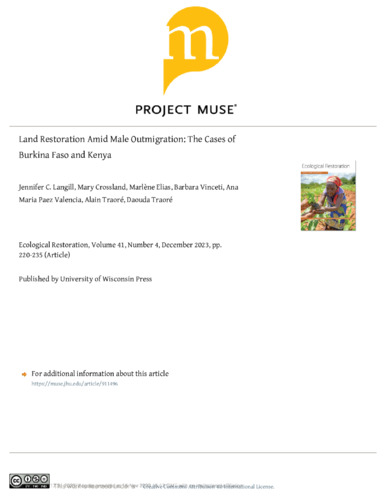Land restoration amid male outmigration: The cases of Burkina Faso and Kenya
Within the global literature on ecological restoration, a subset of literature examines the relationship between smallholder
land restoration and rural outmigration. However, intrahousehold dynamics surrounding the outmigration of one or more
household members and the capacity of the household to undertake land restoration activities are often overlooked.
With analyses rooted in Burkina Faso and Kenya, we explore the relationships between restoration, household labor, and
rural outmigration, which is a prominent livelihood strategy in the two contexts. Our case studies draw on data from
interviews, focus group discussions, and small-n household surveys in Burkina Faso and Kenya. Our analysis substantiates
the need to consider migration in understanding and promoting smallholder land restoration. Our multi-sited approach
further reveals that the contextually-specific characteristics of the migration event (i.e., type of migration [permanent or
temporary], position of the migrant within the household, timing and duration of migration) play an important role in
shaping restoration and gender outcomes. As male heads of households or their sons outmigrate periodically in Kenya
compared to young men leaving seasonally in Burkina Faso, the impacts of migration on intrahousehold gender relations
are more transformative in the Kenyan case study, with women garnering greater decision-making power on the family
farm and in land restoration activities, whereas entrenched gender norms in the Burkina Faso case remain unchallenged
by migration.

